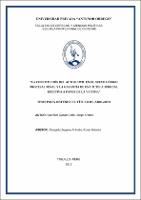Mostrar el registro sencillo del ítem
La constitución del actor civil en el nuevo código procesal penal y la garantía de una tutela judicial efectiva a favor de la víctima
| dc.contributor.advisor | Zegarra Arévalo, Ronald Manolo | |
| dc.contributor.author | Gaitán Caffo, Jorge Andrés | |
| dc.creator | Gaitán Caffo, Jorge Andrés | |
| dc.date.accessioned | 2015-09-21T21:55:25Z | |
| dc.date.available | 2015-09-21T21:55:25Z | |
| dc.date.issued | 2015 | |
| dc.identifier.uri | https://hdl.handle.net/20.500.12759/1123 | |
| dc.description.abstract | El presente trabajo de investigación tiene como objetivo determinar si el acto procesal de constituirse en actor civil para interponer la acción reparatoria en el modelo acusatorio garantista asumido por el NCPP permite la viabilidad de la garantía de una tutela judicial efectiva en favor de la víctima. La recopilación de datos en cuanto a lo teórico debemos decir que utilizamos el método dogmático para lo referente a la información doctrinaria y el método jurídico propositivo en lo referente a la propuesta normativa; en cuanto a la recopilación de datos de campo utilizamos la técnica del análisis de contenido y los instrumentos del cuestionario de expertos que se aplicó a los operadores jurídicos para que aporten su experiencia y conocimiento en torno a nuestra problemática y la guía de registro de datos en donde se consignó todo lo relacionado con los expedientes judiciales. En cuanto a los resultados más importantes que hemos obtenido en nuestra etapa de ejecución es que su tratamiento jurídico es desfavorable por que al dotarles de facultades tendientes a demostrar la comisión del hecho punible desnaturaliza la institución del actor civil, además el exigir al agraviado la constitución en actor civil para poder reclamar la reparación civil no condice con los principios rectores humanistas de un sistema acusatorio garantista con tendencia adversarial, de otro lado las cifras estadísticas de la práctica judicial señalan que su incidencia es baja con un promedio de 56%, que se presenta con mayor incidencia en los delitos de lesiones culposas y conducción de vehículo en estado de ebriedad y que en la mayoría de casos no existe homogeneidad en el quantum del monto de la reparación del daño. La conclusión principal es que las principales causas que impiden que el acto procesal de constituirse en actor civil garantice una verdadera tutela judicial efectiva en favor de la víctima, son su desnaturalización jurídica, la existencia de restricciones en los derechos de la víctima y la falta de acceso a la justicia en igualdad de condiciones; por ello se recomienda la derogación de la institución jurídica del actor civil, así como la modificación del artículo 95.1 del NCPP en el sentido de considerar dentro de los derechos del agraviado solicitar directamente al órgano jurisdiccional condene al imputado a la reparación del daño. | es_PE |
| dc.description.abstract | The present research work aims to determine what are the main causes preventing the procedural act to become a civil actor to bring the compensatory action in the accusatorial model guarantees assumed by the Wilson, to ensure a truly effective judicial protection in favour of the victim. The collection of data regarding the theoretical must say that we use the dogmatic method for doctrinal information and proactive legal method in relation to the policy proposal; regarding the collection of field data we use the technique of content analysis and instruments of the questionnaire of experts applied to legal operators so that they contribute their experience and knowledge in lathe to our problems and guide data where is appropriated everything related to judicial records. In terms of the most important results that we have obtained in our implementation phase is that their legal treatment is unfavorable that give them powers to prove the Commission of the punishable denatures the institution of the civil actor, requiring the aggrieved the Constitution civil actor to claim civil compensation also does not agree with the guiding principles an accusatory system guarantees with adversarial tendency humanistson the other hand statistics of judicial practice point out that its incidence is low with an average of 56%, occurs with increased incidence in charges of negligent injury and driving vehicle while intoxicated and that in the majority of cases there is no homogeneity in the quantum of the amount of the reparation of the damage. The main conclusion is that the main causes that prevent the procedural act of being constituted in civil actor from guaranteeing a real effective judicial tutelage in favor of the victim, are its juridical denaturalization, the restrictions existence in the rights of the victim and the absence of access to the justice on equal terms; by it there is recommended the abolition of the juridical institution of the civil actor, as well as the modification of the article 95.1 of the NCPP in the sense of considering inside the rights of the the injured party to request straight to the jurisdictional organ condemns the imputed one to the repair of the damage. | en_US |
| dc.description.uri | Tesis | es_PE |
| dc.format | application/pdf | es_PE |
| dc.language.iso | spa | es_PE |
| dc.publisher | Universidad Privada Antenor Orrego - UPAO | es_PE |
| dc.rights | info:eu-repo/semantics/openAccess | es_PE |
| dc.source | Universidad Privada Antenor Orrego | es_PE |
| dc.source | Repositorio institucional - UPAO | es_PE |
| dc.subject | Constitución del actor | es_PE |
| dc.subject | Código procesal penal | es_PE |
| dc.title | La constitución del actor civil en el nuevo código procesal penal y la garantía de una tutela judicial efectiva a favor de la víctima | es_PE |
| dc.type | info:eu-repo/semantics/bachelorThesis | es_PE |
| thesis.degree.level | Título Profesional | es_PE |
| thesis.degree.grantor | Universidad Privada Antenor Orrego. Facultad de Derecho y Ciencias Políticas | es_PE |
| thesis.degree.name | Abogado | es_PE |
| thesis.degree.discipline | Derecho | es_PE |
Ficheros en el ítem
Este ítem aparece en la(s) siguiente(s) colección(es)
-
Derecho [422]

